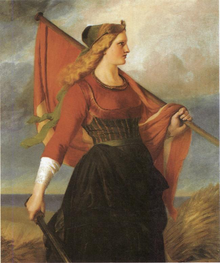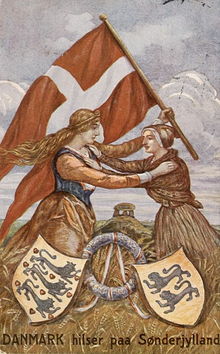The US FDA’s proposed rule on laboratory-developed tests: Impacts on clinical laboratory testing
Contents


Mother Denmark (Danish: Moder Danmark) is the female personification of Denmark and a patriotic emblem of the Danish nation.
History
Allegorial representations of Denmark as a woman with antique garments and a coat of arms are first seen in the 18th century. In the 19th century, with Romantic Nationalism, it became more common. Writers such as N.F.S. Grundtvig, B. S. Ingemann and Steen Steensen Blicher have all used Mother Denmark as a national symbol of Denmark and a manifestation of national emotions.[1]
In 1851, under influence of the Danish victory in the Battle of Isted, Elisabeth Jerichau Baumann created a painting of Mother Denmark in the form of a young woman, with a Dannebrog and Viking jewellery, holding an antique sword, walking through a field. The painting became a model for many later depictions of Mother Denmark.[1]
In the second half of the 20th century, Mother Denmark references grew out of fashion. They have since then mainly been used in caricature drawing.[2]
Monuments and memorials

Many monuments and memorials that commemorate the 1920 Reunification Sønderjylland with Denmark incorporate a Mother Denmark figure, typically accompanied by a daughter, representing Sønderjylland. An example is the Reunification Memorial at the main entrance to Fælledparken in Copenhagen.[3]
A statue of Mother Denmark is also seen in the Danish Emigrants Memorial in Copenhagen.[4]
The sculptor Arne Bang has also created a Mother Denmark sculpture. A bronze cast of it is located in Fensmark.
Cultural references
- Mor Danmark is a 1937 song by Mogens Lorentzen.[5]
Gallery
-
Mother Denmark sculpture as the focalpoint of the Memorial Mound in Copenhagen
-
Relief in Christiansborg: Mother Denmark flanked by Sweden and Norway
-
Carl Thomsen: Mother Denmark
-
Reunification Memorial relief on Sjællandsgade School in Copenhagen
Further reading
- Adriansen, Inge: Mor Danmark, Valkyrie, Skjoldmø og Fædrelandsymbol, In: Folk og Kultur - Årbog for Foreningen Danmarks Folkeminder, 1987.
- Jebsen, Nina: Als die Menschen gefragt wurden, Münster/New York 2015, p. 176/177
References
- ^ a b "Mor Danmark" (in Danish). Gyldendal. Retrieved 11 July 2020.
- ^ "Danmark, Mit moderland". Berlingske (in Danish). 4 January 2010. Retrieved 11 July 2020.
- ^ "Monument For Genforeningen 1930" (in Danish). Dansk Center for Byhistorie. Retrieved 23 December 2018.
- ^ "Mindehøjen" (PDF) (in Danish). Kulturstyrelsen. Retrieved 5 July 2020.
- ^ "Mor Danmark". nomos-dk.dk (in Danish). Retrieved 11 July 2020.





















